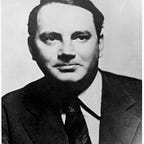Oliver Gant: Through a Brick Wall
Julia Wolfe recalled her husband as “a highly nervous man . . . he knew then that he could try to quiet himself down by taking a drink.” She said, “he was a spree drinker, and he would quit until he would take a spell again…he would go through a brick wall to get it when one of those spells came on . . .” In his early writing, Thomas Wolfe fictionalized his father William Oliver Wolfe as Oliver Gant. In Look Homeward, Angel, he wrote, “day after day he became maniacally drunk, until he fixed himself in a state of constant insanity.” Gant had just learned that he would become the father of an eighth child.
In May 1900, Eliza Gant “sent him off again to a sanitarium at Piedmont to take the cure.” It was not his first attempt to recover from alcoholism. The “Keeley Cure” was in fact administered at an “Institute” in Greensboro, NC. Originated in 1879 in Illinois by Leslie E. Keeley, it was also known as the “Gold Cure.” The Keeley Institute eventually expanded to every state in the United States with over 200 locations. Their slogan was “Drunkenness is a disease, and I can cure it.” Along with rest and regular diet, injections were administered consisting partially of gold, alcohol, and ammonium chloride.
As Thomas Wolfe tells the story, before Gant’s return from the Piedmont in 1900, “Eliza, obviously big with child, … walked sturdily into each of the town’s fourteen saloons, calling up the proprietor or the bar-man behind his counter . . . ‘See here: I just came in to tell you that Mr. Gant is coming back to-morrow, and I want you all to know that if I hear of any of you selling him a drink, I’ll put you in the penitentiary.’” In 1900 there were indeed 14 licenses issued by the Asheville Board of City Alderman to saloons for liquor sales. These licenses were reviewed and renewed semi-annually.
One of the bars, the Eureka Saloon located at 16 W. College Street, was operated by John O’Donnell (1861–1942) who appears in the 1900 Census as a Whiskey Merchant. Wolfe changes his name only slightly to Tim O’Donnel in Look Homeward, Angel. Upon encountering Eliza Gant walking into his establishment, “‘Hell!’ said Tim O’Donnel, thrusting his simian face comically above his counter, ‘I wouldn’t give W.O. a drink now if it was fifteen cents a quart and we was alone in a privy.’” Writing about his father during the Asheville vote for prohibition in 1907, Wolfe again includes O’Donnell as the politician Tim O’Doyle. O’Doyle criticizes Gant's hypocritical support for the “Dry” vote. Again, Thomas Wolfe gives the saloon owner’s face an unflattering physical description. “‘Begod!’ said Tim O’Doyle, wiping a tiny rill of tobacco juice from the thick simian corner of his mouth . . . ‘when we see him coming we hire two extra bottle openers. He used to give the barman a bonus to get up early.’”
Born in Ireland and immigrating to the US at about age 15, John O’Donnell became well known in Asheville’s local politics. Like W.O. Wolfe, he was a supporter of the Republican Party. For thirty years O’Donnell was also an active member of the volunteer fire department. Over his earliest years in Asheville, he was involved with the operation of several saloons. He was soon well-known in the community for his quick Irish wit and his loud booming voice. An advertisement in 1907 for the closing of his liquor business suggests he had been in the business for 23 years. During this time he acquired extensive property holdings in the town. He actively supported the construction of the St. Lawrence Catholic Church. When local prohibition arrived in Asheville, he retired from the whiskey and wine business and began raising Hereford cattle on his ranch near Barnardsville, NC.
More about the Keeley Cure here,
